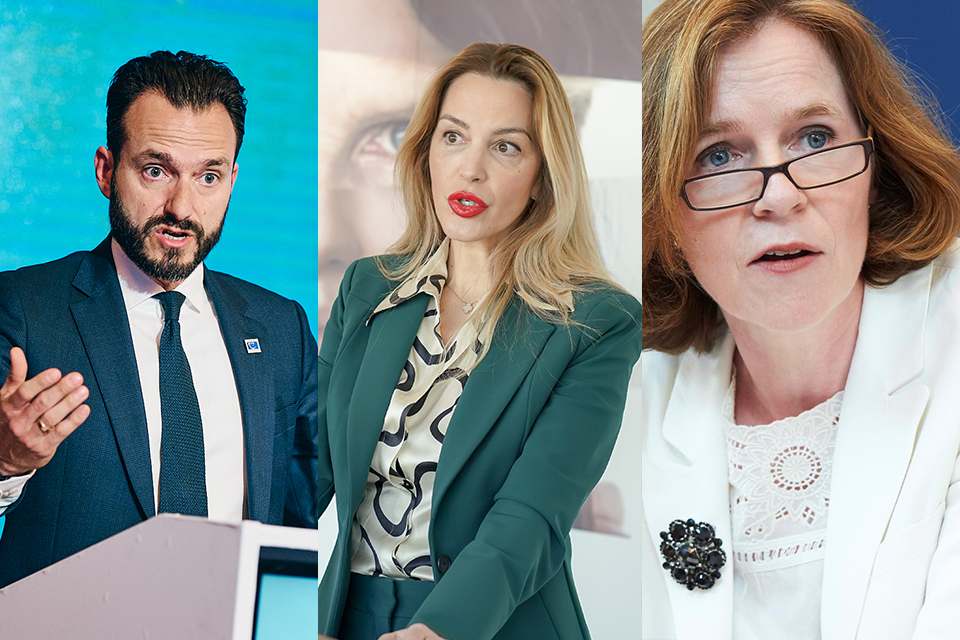10 December 2022
The AIRE Centre marked International Human Rights Day by familiarising the public at large with the recently established Gender Champions in the Judiciary Network (GCJ Network), rallying eminent judges across the region committed to strengthening gender equality in the Western Balkan countries. This is the first network bringing together judicial professionals in the region to promote gender equality. The GCJ Network will have its own Internet platform (www.gcjnetwork.org), which will rally experts in this field, implement regional online training programmes, as well as provide its members with opportunities to share skills, knowledge and experience.

The work of the GCJ Network is coordinated by the AIRE Centre in cooperation with the regional judicial training institutions, with the support of the UK Government. The primary mission of this network of Western Balkan judges engaged in combatting gender bias and stereotypes is to champion gender equality through the practices of all national courts and regional cooperation in building awareness of gender equality in the judiciary. In the context of human rights protection, the AIRE Centre Western Balkans Programme Director Biljana Braithwaite emphasised the importance of recognising which groups were most subject to human rights violations and how the judicial systems could contribute to the efficient protection of their rights.
“Although women and men are equal under the law, women in our region are still in an inferior position to men in all walks of public and private life. Women face numerous challenges, their employment rates are lower, they possess less property, placing them at an economic disadvantage. They are, in particular, affected by prominent and widespread gender-based violence. For women in Balkan societies to live not only a life free of fear but also to fully participate in all aspects of it, such violence must be prevented and penalised and women must be guaranteed equal access to services and equality in enjoying all their rights. Without courts ultimately ensuring that laws are implemented, we remain at the level of declarations. Hence the importance of the message the justice systems are sending by establishing this Network: We recognise the importance of gender equality and we are ready to contribute to the realisation of human rights and freedoms in the region,“ said Director Braithwaite.
The GCJ Network’s patrons include European Court of Human Rights President Siofra O’Leary, former ECtHR President Robert Spano and judges from the region: Ivana Jelić, Mirjana Lazarova Trajkovska and Ledi Bianku.
“Gender equality is central to human rights protection, the functioning of democracy and good governance, as well as respect for the rule of law and the promotion of well-being for all. The GCJ Network couldn’t be more relevant in your Region and across Europe as a whole. I am proud to be one of its patrons,“ said ECtHR President O’Leary.
“Courts are an integral part of the way we see the regulation of social reality. If they are to successfully navigate through the complex challenges of life, they must understand the basic structures of power and patterns of human behaviour, giving life to the law. Continued education on issues such as gender equality is, therefore, an important part of a judicial office. Gender equality is ultimately one of the pillars of any society aspiring to be a genuine democracy guided by the rule of law. I’m honoured to be President of the Board of Patrons of the GCJ Network. Gender based discrimination in any form, and most particularly violence against women, must be fought at all costs. I have dedicated my career, not least the last 9 years as a Judge and then President of the European Court of Human Rights, to securing the equality of men and women as a most fundamental human right. Judges are on the front line of this battle, especially so in the region. Men and women must play their roles here with equal strength. I look forward to playing my role and giving the network my full support,“ Robert Spano said.
The GCJ Network was established by the AIRE Centre in partnership with the judicial academies and judicial and prosecutorial training centres in Albania, Bosnia and Herzegovina, Montenegro, Kosovo, North Macedonia and Serbia, which joined the network in July 2022. Director Braithwaite stressed that the joint activities would aim to build awareness of the nature and ramifications of gender stereotypes in Western Balkan societies, on their adverse effects on court decisions and the judiciary’s role in addressing those issues.
“The GCJ Network will build on the judges’ skills, knowledge and practices concerning gender equality and gender stereotypes. Together, we must encourage the effective implementation of national, European and international legal instruments on gender equality and facilitate the exchange of skills, knowledge, experience and ideas regarding gender equality among judges and legal practitioners across the region. And finally, the GCJ Network will support the improvement of the professional and personal development of female judges in the region. We would like to thank everyone who supported the initiative. Let’s mark International Human Rights Day by opening a new chapter in the judiciary committed to championing gender equality,“ Director Braithwaite concluded.